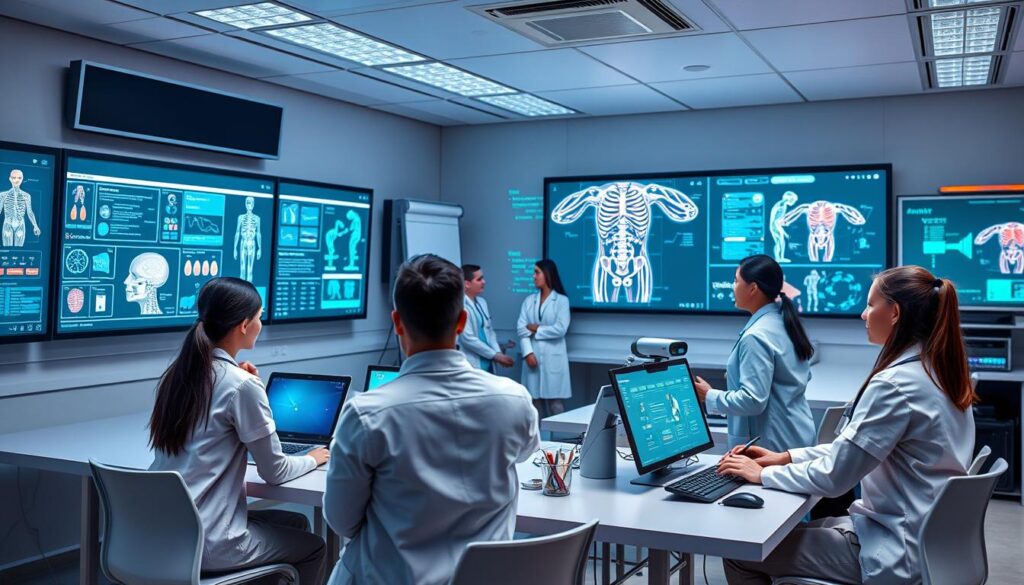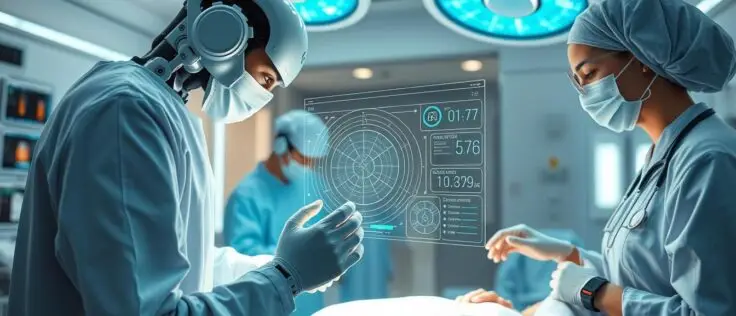Could AI in Healthcare be the answer we’ve been searching for? This question not only challenges existing health practices but also highlights the AI revolution happening in clinics and hospitals worldwide. With healthcare AI projected to hit $6 billion by 20211, and a significant rise in the elderly population expected by 20502, the need for innovative solutions is clear.
AI in healthcare is now leading the way in tackling major challenges, such as the predicted shortage of healthcare professionals by 20302. It promises a range, from enhancing drug discovery with Machine Learning1 to using Predictive Analytics for patient risk assessment1. The growth in AI adoption is evident, with significant venture capital investment showing strong confidence in AI’s future in healthcare.
However, there are challenges like data privacy and the need for reliable data1. Despite these hurdles, AI tools, such as the FDA-approved analysis of Cardiac MRI images1, are making strides in clinical settings. This blend of need and innovation, where AI supports healthcare professionals, is transforming patient care and the future of healthcare.
Introduction to AI in the Healthcare Ecosystem
AI is changing healthcare, promising much better outcomes for patients. The AI health market is expected to boom, rising to USD 6.6 billion by 2021. This growth means huge savings in US healthcare costs, reaching up to USD 150 billion by 20263.
AI does more than just save money; it changes how hospitals work. By understanding huge amounts of data, AI makes diagnoses and treatments more accurate. This helps doctors make better decisions quickly, especially with complex data like medical images3.
The world is taking notice of AI’s power in healthcare, with big events like Intelligent Health. These events bring together over 260,000 people from technology and healthcare to share ideas. They discuss how AI can improve care in areas like oncology and cardiology4.
AI is also great for creating treatments just for you, using your genes and health history. AI algorithms are getting really good, sometimes even better than humans, at certain medical tasks3.
Addressing Healthcare Challenges with Artificial Intelligence in Healthcare
Artificial Intelligence (AI) is changing healthcare by aiming for four main goals. These are improving public health, bettering patient care, making carers’ jobs easier, and cutting costs.
The Quadruple Aim of Healthcare Improvement
AI is key in reshaping healthcare. It works on crucial aims by using smart algorithms and learning from data. This makes patient care better and saves money. AI looks at lots of data to understand diseases and what patients need. This helps improve the health of the whole population5.
Overcoming Workforce Challenges with AI Solutions
AI also tackles the shortage of staff, which is a big problem in healthcare. For example, NHS trusts could lack almost 250,000 staff by 2030. AI helps by doing routine tasks and helping with medical decisions. This means healthcare workers can spend more time on patient care6.
Cloud Computing: Catalysing AI-enabled Healthcare Innovations
Putting AI in healthcare faces hurdles, but ongoing progress and teamwork between tech and healthcare sectors are key. AI promises to improve patient care, cut mistakes, and secure healthcare’s future. Cloud computing is critical for managing data safely and effectively, ensuring AI makes patient care and operations better7.
Enhancing Patient Care through Predictive Analytics and AI Algorithms
In today’s healthcare world, AI and predictive analytics are changing how we care for patients. They switch our focus from waiting for illness to preventing it. Healthcare experts use AI to quickly and accurately look at medical images, tests, and records. This helps spot diseases early and plan treatments better, giving each patient a care plan just for them8.
Predictive analytics, a key part of AI, uses loads of data to predict and prevent health problems before they get worse. This technology reduces the need for patients to go back to the hospital and cuts healthcare costs. It makes healthcare services work better. Plus, as we gather more patient data, AI models get smarter. This helps doctors decide on the best treatment plans9.
AI in healthcare isn’t just for typical doctor’s appointments. It’s also for areas like gastroenterology and endoscopy. AI helps doctors by giving them detailed patient histories before they meet. Also, using AI means healthcare is more about using digital tools to help patients. It makes clinics work better and drives new ways to look after patients9.
Natural language processing, a type of AI, lets medical staff quickly look through lots of clinical notes. This greatly reduces paperwork. Thanks to AI, healthcare is becoming more forward-thinking and tailored to each person. It’s a big step towards keeping society healthier for longer.
AI's Role in Advancing Personalized Medicine and Diagnosis Automation
Artificial intelligence (AI) is changing personalized medicine for the better. It uses smart algorithms and deep learning to make medical imaging and diagnosis better. As a result, patients get treatments that fit them better, leading to improved health outcomes.
Early Disease Detection and Accurate Diagnoses
Finding diseases early is key to treating them right, especially serious ones like cancer. AI digs into medical images with deep learning, making some amazing breakthroughs. For one, it’s made these tests more precise and scaled them up. It also means fewer false alarms and less need for unnecessary cancer treatments10. AI shows great promise in catching diseases early and giving accurate diagnoses. This supports tailored medicine and lifts patient care quality.
Customising Treatment Plans with Machine Learning Insights
Machine learning’s skill in handling lots of data has sharpened how we personalise treatments. By looking at genes, environment, and lifestyle, AI reveals disease secrets. This leads to personal treatment strategies. For example, in pharmacogenomics, it predicts how patients might react to medicines. This helps to sort out the best treatment plans for each person11.
As AI gets better, it aims to improve both diagnostics and treatments. But it’s also changing how doctors and patients connect. It’s making healthcare clearer, more relatable, and comforting for everyone.
Driving Efficiency in Clinical Trials and Medical Research
The use of AI in Clinical Trials is changing medical research in huge ways. It’s making clinical trials more efficient and improving the quality of research. AI tech like machine learning and natural language processing is making drug development faster12. Machine learning helps in looking at large amounts of Health Data from trials. It finds patterns that show how drugs work and what outcomes patients might have. This cuts down on errors and time needed for studies12.
AI platforms can deal with lots of Health Data very accurately. For instance, they check data from wearable devices that record patient health live during trials. This makes monitoring patients deeper and more trustworthy12. AI also plays a big part in trials run from different places. It makes sure data analysis stays strict and patient privacy is not broken, even in diverse research settings12.
Tools like Trial Pathfinder, powered by AI, are great in getting more patients to join studies. This lowers costs and shortens the time it takes to find people for studies13. Clinical trials need many participants at each stage to test if treatments are safe and work. AI helps in making these steps faster and better at every phase, from initial small tests to later big ones14.
AI also helps a lot in finding new ways to treat illnesses and markers for diseases. This is key for treatments that are tailored to individual patients. One big step forward is how AI can find new disease markers. This could lead to therapies aimed directly at specific problems, helping both research and treatment accuracy12.
AI is making clinical trials quicker, cheaper, and more successful. It’s playing a big role in medical research. Ultimately, this means faster access to new treatments for patients.
AI and Robotics: Pioneering New Frontiers in Patient Care and Assistance
The merging of AI and robotics is changing healthcare in big ways. These technologies are creating new possibilities in medical care. They are seamlessly blending into healthcare, redefining what we can achieve.
The Spectrum of Robotics in Healthcare from Surgery to Care Assistance
Robotics in healthcare is quickly changing, moving from diagnostics to direct care. Surgical robotics, for example, improves how doctors perform operations. The da Vinci Surgical System gives surgeons more precision, making complex surgeries safer. This technology helps make surgeries more accurate than ever before15.
Robotics are also helping patients recover. Devices like the Lokomat are aiding those with mobility problems to regain strength. Such technology significantly boosts the recovery process15.
Extending Quality of Life with Assistive AI Technologies
Assistive AI is vital for improving life quality, especially for the elderly and those with long-term illnesses. It helps them become more independent. This reduces the need to stay in hospitals, promoting respect and dignity in living. Social robots like Aibo offer companionship, helping manage loneliness and keep mental sharpness in older individuals15.
Moreover, humanoid robots are being developed for end-of-life care. They are designed to meet complex emotional needs, ensuring respect for patients throughout their care15.
These leaps in healthcare robotics and AI are not only improving current methods but also setting the stage for future breakthroughs. The combination of AI and robots is opening up new possibilities in care. It builds a future where technology and human skills work together, achieving things once thought impossible. Ongoing AI research in fields like biomechatronics and nanorobotics continues to push these boundaries1516.
Streamlining Health Data Management and Enhancing Clinical Decisions
The use of AI in healthcare is changing the game. It is key in improving clinical decisions and managing health data better. AI is seen as crucial in the NHS for increasing healthcare effectiveness and the quality of care, despite big challenges17. These challenges include staff shortages and a rise in demand.
A major hurdle is the lack of a unified strategy and teamwork among key players. To make the most of AI in healthcare, we need to listen to the public and professionals. It’s about setting clear goals, building the right digital tools, and ensuring top-notch tests and reviews17. All these steps are vital for using AI to enhance health data handling and decision-making.
AI also opens new doors for mental health care, improving access and treatment quality. The need for these technologies grew quickly with the COVID-19 pandemic affecting mental health services18. AI tools are great at analysing loads of data rapidly. This leads to more accurate diagnoses and custom treatments for diseases like breast cancer, skin cancer, and heart conditions18.
Changes in healthcare practices are not just about managing data well now but also about using AI responsibly for support in the future. Keeping ethical and safe use of AI at the forefront is key. This ensures health care improvements translate into better patient care and privacy17.
Fostering Healthcare Workforce Development through AI Training Tools
The use of AI in Healthcare Education is changing how medical training and development are done. AI-driven solutions from companies like StellaVersed Consulting Firm give healthcare teams the tools to improve their learning programs. They help them keep up with new technology19.

Healthcare needs to keep learning because of the quick changes from AI and automation. It’s vital for healthcare teams to gain advanced technical skills, understand data, and use AI tools well. This matches the needs of today’s medical work19.
Training simulations that mimic real-life situations are also key. They help healthcare workers learn to think critically and make decisions in a safe space20.
Transforming Healthcare Education and Continuous Learning
Empowering Healthcare Workers with AI-augmented Training Simulations
AI simulations are key to improving team skills, getting better at our jobs, and filling in skill gaps19. According to Meskó and others, AI can help fix the shortage of healthcare workers. It does this by making the workforce stronger21. By using smart simulations in training, healthcare workers get to learn in ways that really prepare them for challenges. This makes healthcare better and helps patients more.
Laschinger and team also showed that giving nurses special training makes them more engaged and less burnt out21. This shows how good education and development strategies can really make a difference in healthcare.
Conclusion
The horizon of AI Healthcare Transformation shines with a bright future. It shows how artificial intelligence is improving how we care for patients. AI boosts healthcare by offering personalised info, improving medical scans, and making feedback systems automatic22. It also quickens the pace of diagnosing through better image analysis and predictive analytics22. As these technologies evolve, they help predict and sometimes prevent patient health issues. This marks a step towards health management that looks ahead23.
The use of AI is changing healthcare for the better. It helps in making skin disease diagnoses as accurate as a dermatologist’s and supports the ongoing learning of medical students23. Now, healthcare isn’t just about reacting. It’s about predicting health risks and ensuring patients stick to their treatments. AI makes healthcare more thorough and active in keeping us healthy23.
Looking ahead, AI will touch every part of healthcare. It will lighten the workload for medical staff and expand self-check tools for patients23. This blend of goals and advanced tech is transforming how we deliver healthcare. It’s an AI-driven change that brings more efficient, effective, and tailored patient care. It strengthens the dream of a healthcare system ready for the needs of future generations.
FAQ
How is Artificial Intelligence transforming the healthcare industry?
Artificial Intelligence (AI) is making big changes in healthcare. It gives us deep insights from data to improve how we look after patients. It helps predict health issues before they happen, making treatments better. AI is used in reading medical scans, making diagnoses quicker, and designing personal medicine. It aims to improve health for everyone, make patient and doctor experiences better, and reduce costs too.
What role does AI play in the healthcare ecosystem?
AI is very important in healthcare. It helps doctors in making choices, makes healthcare processes smoother, and treatments more specific. From managing paperwork to creating personal care plans, AI is boosting both health results and how hospitals run.
How does AI address the quadruple aim of healthcare improvement?
AI helps in achieving four big goals: better care for patients, improving overall health, making doctors’ jobs easier, and cutting healthcare costs. It does this by bringing in smart diagnostics and careful analysis of big data. AI reduces paperwork and makes operations efficient, benefiting everyone in healthcare.
How can AI solutions help overcome workforce challenges in healthcare?
AI eases workforce problems by taking over routine tasks, aiding in clinical decisions, and expanding telemedicine. It means less pressure on limited resources. AI also provides tools for training healthcare staff, improving care quality without more hiring.
How is cloud computing catalysing AI-enabled healthcare innovations?
Cloud computing is driving AI in healthcare forward. It offers the power and space for AI to work well. This setup lets health data be analysed in huge amounts, boosting team work, and quickly bringing AI into use safely and widely.
In what ways are predictive analytics and AI algorithms enhancing patient care?
Predictive analytics and AI are making patient care better by spotting health risks early for timely action. They create care plans that suit each person and encourage sticking to treatments. This all leads to better health and less strain on hospitals by preventing unnecessary issues.
How is AI advancing personalized medicine and diagnosis automation?
AI moves personalized medicine and diagnosis forward by understanding patient data for custom treatments. It’s smart at catching diseases early by reading scans and tests with high accuracy. This speeds up getting diagnoses, enables quick actions, and supports treatments made just for you.
What impact is AI having on clinical trials and medical research?
AI is changing clinical trials and research by making drug making faster and cheaper. It sorts through complex data quickly, predicts outcomes well, and helps find the right trial participants. AI is cutting both time and expenses in launching new treatments.
In what capacity is robotics, in conjunction with AI, serving patient care?
Robotics combined with AI helps in patient care from precise surgeries to daily support. These technologies assist medical staff, improve surgery results, help with recovery, and uplift patient life quality through robotic support and care.
How are AI and robotics extending the quality of life for patients?
AI and robotics help patients live better and longer. They support daily activities, monitor health, and provide company. This helps manage long-term illnesses and decrease the need for constant institutional care.
What advancements are AI bringing to health data management and clinical decisions?
AI is making health data management better by handling large data efficiently and giving useful insights for clinical decisions. It backs up decisions with solid evidence, bespoke medicine, and improves healthcare quality for everyone.
How is AI transforming healthcare education and workforce development?
AI is changing healthcare education and workforce growth by offering advanced learning tools that adjust as learners progress. These tools give healthcare workers the chance to practice realistic scenarios, improving their skills and patient care.
Source Links
- How AI Is Transforming The Future Of Healthcare – https://www.internationalsos.com/magazine/how-ai-is-transforming-the-future-of-healthcare
- Transforming healthcare with AI: The impact on the workforce and organizations – https://www.mckinsey.com/industries/healthcare/our-insights/transforming-healthcare-with-ai
- The rise of artificial intelligence in healthcare applications – https://www.ncbi.nlm.nih.gov/pmc/articles/PMC7325854/
- Intelligent Health – https://intelligenthealth.ai/
- The potential for artificial intelligence in healthcare – https://www.ncbi.nlm.nih.gov/pmc/articles/PMC6616181/
- Artificial intelligence in healthcare: transforming the practice of medicine – https://www.ncbi.nlm.nih.gov/pmc/articles/PMC8285156/
- AI in healthcare – 10 promising interventions – https://evidence.nihr.ac.uk/collection/artificial-intelligence-10-promising-interventions-for-healthcare/
- AI In Healthcare: Enhancing Patient Care Through Innovation – https://www.linkedin.com/pulse/ai-healthcare-enhancing-patient-care-through-oluwaseun-aoqbf
- Enhancing patient care through workflow automation and human-centred AI – https://www.mayoclinichealthcare.co.uk/news-for-referrers/enhancing-patient-care-through-workflow-automation-and-human-centred-ai
- Precision Medicine, AI, and the Future of Personalized Health Care – https://www.ncbi.nlm.nih.gov/pmc/articles/PMC7877825/
- Revolutionizing healthcare: the role of artificial intelligence in clinical practice – BMC Medical Education – https://bmcmededuc.biomedcentral.com/articles/10.1186/s12909-023-04698-z
- The Impact of Artificial Intelligence (AI) on Clinical Research: A Comprehensive Guide – https://www.lindushealth.com/blog/the-impact-of-artificial-intelligence-ai-on-clinical-research-a-comprehensive-guide
- Harnessing artificial intelligence to improve clinical trial design – Communications Medicine – https://www.nature.com/articles/s43856-023-00425-3
- Revolutionizing clinical trials: the role of AI in accelerating medical breakthroughs – https://www.ncbi.nlm.nih.gov/pmc/articles/PMC10720846/
- Pioneering New Frontiers in Healthcare – https://www.theblifemovement.com/pioneering-new-frontiers-in-healthcare/
- The Convergence of AI and Robotics: Pioneering a New Frontier in Technological Evolution – https://www.linkedin.com/pulse/convergence-ai-robotics-pioneering-new-frontier-con-hrisikos-uptrc
- Priorities for an AI in health care strategy – https://www.health.org.uk/publications/long-reads/priorities-for-an-ai-in-health-care-strategy
- Artificial Intelligence and Decision-Making in Healthcare: A Thematic Analysis of a Systematic Review of Reviews – https://www.ncbi.nlm.nih.gov/pmc/articles/PMC10916499/
- The Transformative Power of AI and Automation in Healthcare: Shaping the Future of Workforce Development – https://stellaversedconsulting.com/ai-in-healthcare-workforce-development/
- Artificial Intelligence Education Programs for Health Care Professionals: Scoping Review – https://www.ncbi.nlm.nih.gov/pmc/articles/PMC8713099/
- Artificial intelligence: opportunities and implications for the health workforce – https://www.ncbi.nlm.nih.gov/pmc/articles/PMC7322190/
- Artificial intelligence in healthcare and education – British Dental Journal – https://www.nature.com/articles/s41415-023-5845-2
- Overview of artificial intelligence in medicine – https://www.ncbi.nlm.nih.gov/pmc/articles/PMC6691444/






